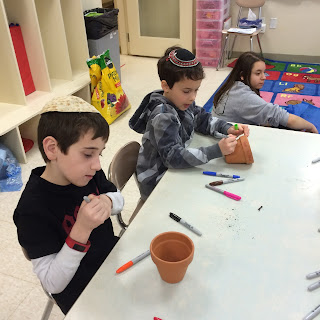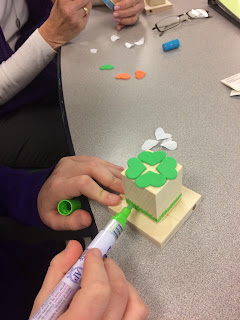Gesher is amazing!
Today we participated in
our communal Tefillah then Gesher
students and collected the siddurim
(prayer books). Since this is Shabbat
Shirah, the Shabbat on which Shirat
haYam (the song of the sea) is chanted, we made bird feeders from pinecones,
vegetable shortening and bird seed, because
“Some have the custom this Shabbat, which is
called Shabbat Shira, to place food, seeds, wheat kernels, and the like in
front of birds as a commemoration of the Midrash which states that the children
of the Jewish nation fed seeds that grew from the trees inside the Red Sea to
birds and these birds joined in Israel’s song of praise to God.”
After making our bird
feeders and nourishing ourselves with our own snacks, we embarked on a study of
Parashat Beshallach. First we experienced an overview of the
weekly Torah portion with a parasha
play from Sedra Scenes. Then we
dug deeper examining the Torah text and exploring some ancient and contemporary
midrash: This following story provides an introduction
to the Nachshon midrash since it invites us to consider our own participation
and responsibility in redemption.
God Will
Surely Help
Morris was a G-d-fearing man. When the warning was sounded that a flood was
coming, he had complete trust; G-d would protect him. So he remained in his home even while others
fled. The local police came to his door
and offered to help him evacuate, but he assured them: “Don’t worry, G-d will save me.” The rains came and the waters began to
rise. The emergency rescue team came to
his house in a boat and urged him to leave, but Morris refused to go with them,
saying, “I’m not worried, G-d will save me.”
As the flood worsened, Morris finally moved to the roof of his house to
escape the water. A military helicopter
flew over to him; but Morris turned
them down, insisting, “I trust in G-d.
He will provide a miracle.”
Unfortunately, the storm continued unabated. Morris was carried off and drowned.
When Morris arrived in heaven, he was enraged. Morris approached the holy throne: “G-d how could you abandon me when I put all
my trust in You?” Quickly, a response came, “Morris, I tried to help you. I sent your three miracles: the police in a car, the rescue workers in a
boat, and the army in a helicopter. What
were you waiting for?”
Having considered our own responsibility to
realize and recognize our own responsibility to act we discussed the midrash of Nachshon:
NACHSHON, A MIDRASH
(as told by Rabbi Ed Feinstein in Dancing on the
Edge of the World)
In this week’s
parasha, we will find the Israelites, newly freed from slavery, camped at the
shores of the sea.
Suddenly the
rumbling of Pharaoh’s approaching chariots fill the air. Realizing they are trapped, the former slaves
cry bitterly to Moses. “Were there too
few graves in Egypt that you brought us to die here?”
Moses prays for
deliverance.
God directs him,
“Tell the Israelites to go forward. Lift
up your rod and hold out your arm over the sea and it will split.”
Moses lifts his
rod, the sea splits, and the Israelites cross in safety. Then they behold the final act of the Exodus
drama: the sea comes crashing down upon
Pharaoh and his armies. The Egyptians
drown in the Sea of Reeds just as they once drowned Israelite babies in the
Nile. The Israelites raise their voices
in song. They have been slaves, their
parents were slaves, and their grandparents were slaves. But suddenly, over night, freedom and the
promised return to the land of their forefathers.
That’s how the
Torah tells the story. But the midrash
adds a new dimension. According to the
midrash, the people cry out, Moses prays, God commands. But when Moses lifts his rod, nothing
happens. Moses tries again, carefully
rehearsing God’s words to himself. And
again, nothing. Panic wells up within
him, he tries again, and again. The sea
does not move. As beads of perspiration
break out on his forehead, the people renew their screams of terror, but Moses
is powerless.
And then suddenly,
out of the crowd comes one man, Nachshon from the tribe of Judah. To the astonishment of the people gathered on
the shores of the sea, Nachshon jumps into the water.
“Are you
crazy? What are you doing?” shouts his
family.
But Nachshon knows
exactly what he is doing. He
understands, as does no one else, not even Moses, why the sea would not
split. He understands that until this
moment, all of the redemption had been enacted by God: God had sent Moses to Pharaoh, God had sent
the plagues that shattered Pharaoh’s arrogance, God had brought his people to
the shores of the sea…everything accomplished by God.
But now God is
waiting…waiting to see if any one, just one, of the Israelites is willing to
take a risk for the sake of the promised freedom. Realizing this, Nachshon jumps in. He wades out into the water. The water covers his feet, his lower legs,
his knees, and rises to his waist. His family and friends call to him
frantically, “Nachshon, come back!
Nachshon, you will drown!” The
water reaches his chest, then his neck.
His family’s screams fade, and his people stand in silence, watching in
wonder. He wades out and the water
reaches still higher. The water covers
his chin, his lips, his nostrils, his eyes…
The water rises up beyond his forehead.
And when it reaches and covers the top of his head and his life is in
peril, only then does the sea open creating a secure path for the Israelites to
cross.
And then he is
followed by the rest of the Israelites, who pass in safety.
This midrash
teaches that God can only create the conditions for redemption of the
world. But if redemption is truly to
come, someone must jump into the water.
Someone visionary and brave must be willing to put life on the line and
jump into the waters of history to bring the rest of us out of slavery.
In every
generation there are Nachshons willing to jump into the water. Sometimes the water splits, and sometimes it
doesn’t. But those who have the faith to
take the first courageous step redeem the rest of us still hovering on the
shore.
We discussed
historic persona who were also Nachshons (Reverend Dr. Martin Luther King, Jr.,
Rosa Parks, W.E. Debois, Desmond Montella)
and then examined other midrashim:
The Israelites at the Red Sea were divided into four
groups.
|
One
group said, “Let us throw ourselves into the sea.”
|
The
group that said, “Let us throw ourselves into the sea,” was told,
“Stand
by, and witness the deliverance that the Lord will work for you today.”
|
One
said, “Let us return to Egypt.”
|
The
one that said, “Let us return to Egypt,” was told,
“For
the Egyptians whom you see today you will never see again.”
|
One
said, “Let us fight against them.”
|
The
one that said, “Let us fight them,” was told,
“The
Lord will do battle for you.”
|
And
one said, “Let us scream out against them.”
|
The
one that said, “Let us scream out against them,” was told,
“And
you shall hold your peace.”
|
- What are the potential
consequences for each group based on their response?
- Which group would you
have joined and why?
- What does this midrash
suggest about Jewish unity?
- What does each answer
mean?
The Holy One, blessed be He, would bring the horse
and his driver and make them stand trial.
He would say to the horse, “Why did you run after My children?” The horse would answer, “The Egyptian drove
me against my will, as it is said: ‘And
the Egyptians pursued…’” (Exodus 14:9)
G-d would then say to the Egyptian, “Why did you
pursue My children?” And he would answer, “It was the horse that ran away with
me against my will, as it is said, ‘For
the horses of Pharaoh went in…’” (Exodus 15:19)
What would G-d do?
He would make the man ride upon the horse and thus
judge them together. As it is said, “The horse and driver He has hurled into the
sea” (Exodus 15:1).
- What contemporary
situations does this midrash make you think about?
- What might the midrash be
saying about human nature?
- Earlier in the Book of
Exodus, G-d says,
“And I will stiffen the hearts
of the Egyptians so that they go in after them; and I will gain glory through
Pharaoh and his warriors, his chariots and his horsemen” (Exodus 14:17).
· With this in mind, what is
your reaction to the midrash?
Our day ended by opening the Chumash and looking at
chapter 15 to see the unusual spacing of the words in the Shirat haYam section of the parasha. And also considering Miriam’s song, Exodus
15: 21-22.





















